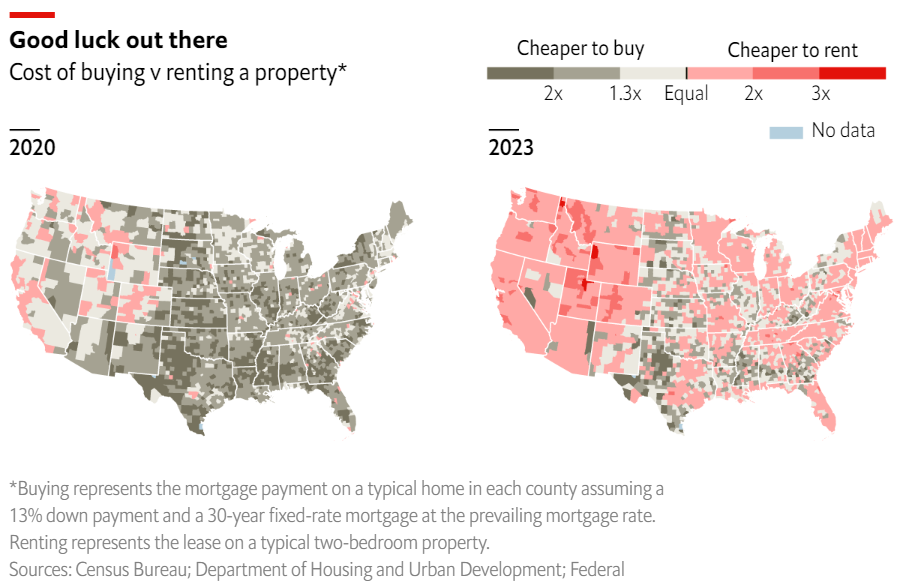
Graphic detail
Nov. 28, 2023
For years new home-buyers in America have enjoyed lower housing payments than renters. Between 2011 and 2020 the monthly mortgage payment on a typical home was 12% lower than the rental cost of a similar property (assuming a deposit of 13%, the current national average). A steady rise in home values, worth roughly 7% per year over the past decade, also ensured buyers built equity in their homes. But, as our maps below show, today the choice between buying and renting looks very different.

Housing Finance Agency; Zillow; The Economist
Blame high house prices and soaring mortgage rates. Since 2020 nominal house prices have climbed by roughly 40%. In the same period the average 30-year fixed-rate mortgage rose from 3.1% to 7.3%, lifting the mortgage repayments on a typical house by more than 50%. All this means nominal mortgage payments have more than doubled since 2020; rents, by contrast, have risen by roughly 20%. By our calculations, for 89% of Americans renting a two-bedroom dwelling is now cheaper than buying a comparable property. Three years ago the figure was 16%.
Our calculations do not cover long-term potential costs and benefits, such as outlays on maintenance, the asset value of a home once a mortgage has been paid off, or the opportunity cost of investing in a deposit for a house rather than, say, the stock market. But they do show how the relative costs of buying and renting have been upended throughout much of America. To restore the ownership advantage that prevailed in the 2010s would require dramatic shifts in market conditions. By our reckoning, house prices would have to tumble by one-third, average mortgage rates would have to fall to 3.2%, or rental costs would have to rise by at least 50%.
None of these outcomes seems likely. House prices are not expected to crash: economists at Goldman Sachs, a bank, forecast that they will appreciate by 1.9% in 2024 and 2.8% in 2025. Mortgages are expected to stay pricey, too. Goldman predicts that 30-year mortgage rates will dip, but not by much: to 7.1% by the end of 2024 and 6.6% by the end of 2025. Rents, meanwhile, seem unlikely to climb much, owing to a glut of newly built apartments and lackluster demand.
Even in the few markets where homes still look relatively cheap—such as Baltimore, Philadelphia and the Bronx, in New York City—most homeowners are reluctant to sell. Nearly all have locked in mortgage rates that are much lower than ones available to new borrowers. More than four in five existing mortgage-holders pay an interest rate under 5%, according to Torsten Slok of Apollo, a private-equity firm. For now, then, market conditions seem likely to put off millions of potential buyers and sellers of houses. For many, renting will increasingly look like the affordable option.■


